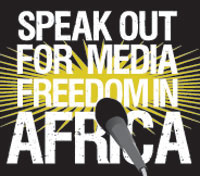
Top stories



ICTVodafone teams up with Amazon's satellites to connect masts in Europe and Africa
Paul Sandle 22 hours


ESG & Sustainability#AGES2026: How to back Africa's next-gen green and blue entrepreneurs
Maroefah Smith 26 Feb 2026


The plea came, following beatings and harassment that journalists suffered during a similar demonstration that took place in July where police killed 19 unarmed civilians and seriously injured 25 journalists.
In a statement issued on the eve of the planned 17 August demonstrations by Kaitira Kandjii, MISA's regional director, notes that a particular concern to MISA were the attacks on journalists who by virtue of their work should be allowed safe access to information.
"Journalists are at the forefront, risking their lives in the process of seeking information. Government should therefore ensure their ability to access information so that citizens ultimately have access to that same information," pleaded Kandjii in the statement.
Kandjii said the extensive torture, beatings and inhuman treatment experienced by civil society leaders, journalists and innocent civilians at the hands of the Malawian police last month is outrightly unconstitutional and a grave infringement of human rights.
"MISA Regional Secretariat appeals to the Mutharika government and its police officials to take heed in monitoring that such prospective violations are reasonably averted. In doing so, the Mutharika government's adherence to relevant international and national law is vital," the statement said.
The statement also acknowledged findings released on 15 August 2011, by the Malawi government's Human Rights Commission, which confirmed that police indeed used excessive force to quell the violent demonstrations in July.
The Commission confirmed reports that 19 people had been killed and another 58 others were shot by police who used more force than necessary against protesters, including live bullets. Amongst the injured were 25 journalists.
"As a human rights-based organisation MISA condemns any efforts to restrict citizens from exercising their democratic right to protest if they feel their Government is not responsive to their needs," says Kandjii, adding "This is exactly what Malawians did on July 20 and 21 when they took to the streets to protest against continued maladministration and violations of the constitution despite government attempts to intimidate them."
The statement then quotes the United Nations' Basic Principles on the use of force and firearms by Law Enforcement Agencies which was adopted by the Eighth UN Congress on the Prevention of Crime and the Treatment of Offenders, Havana, Cuba, in 1990. The UN Congress resolved that "... law enforcement officials, in carrying out their duty, shall, as far as possible, apply non-violent means before resorting to the use of force and firearms. They may use force and firearms only if other means remain ineffective or without any promise of achieving the intended result."
Kandjii then quoted the Malawi Constitution which states in Chapter IV, section 15 that, "the human rights and freedoms enshrined in this Chapter shall be respected and upheld by the executive, legislature and judiciary and all organs of the Government and its agencies and, where applicable to them, by all natural and legal persons in Malawi and shall be enforceable in the manner prescribed in this Chapter".
Therefore, the Constitution further states one's rights to human dignity and personal freedom (section 19(3)), freedom of expression (section 35) and freedom of assembly (section 38) are to be enforced by the Malawian government and Police Services in maintaining the protection of civilians when exercising their roles and responsibilities, as proclaimed by the Commonwealth Human Rights Initiative (CHRI).
Kandjii says MISA Regional Secretariat concurs with the CHRI in condemning the routine use of intimidation, beatings, illegal detention, torture and excessive use of force employed on the July 20 and 21 demonstrations to curb legitimate expressions of dissent and the right to freedom of speech and peaceful assembly.
"It is important to note that the Police Services of Malawi as stipulated in Chapter 15 of the Constitution, have a dual duty not only to protect their citizens against external forces but also against the misuse of power afforded by them in an effort to accomplish their former duty. Therefore, the eventual occurrence of such an infringement should be eradicated," explained the regional media body head.
"We remain hopeful that the Mutharika government will show leadership and prove its commitment to the good governance and the well-being of its citizens by ensuring a peaceful resolution to the ongoing dialogue," says Kandjii.
At the moment, United Nations officials are in Malawi to try to save the situation as it was getting out of hand. After the first meeting between civil society leadership and a committee that President Mutharika has established called Presidential Committee on Contact and Dialogue a communiqué has been issued.
"Concerned with the challenges facing the country and in the spirit of promoting peace and unity in Malawi, representatives of Civil Society Organisations (CSOs) and Presidential Committee on Contact and Dialogue held a preliminary dialogue meeting on 16 August, 2011 at Capital Hotel facilitated by the United Nations Representatives from both headquarters and Malawi Office," says the introductory statement of the communiqué.
It also notes that the objective of the meeting was to explore modalities on dialogue following the presentation of a petition to the Head of State on 20 July 2011. The parties have since come up with agreed several points that they have discussed including one where they say the demonstrations could still be held within a period of four weeks.
"The parties further resolved that the date may be reviewed in due course depending on the progress on the initiative on dialogue," the communiqué says.
